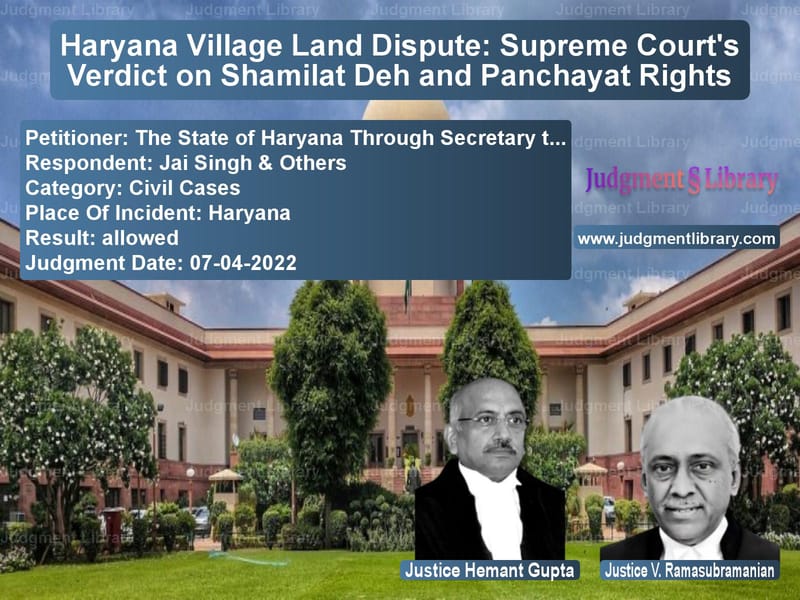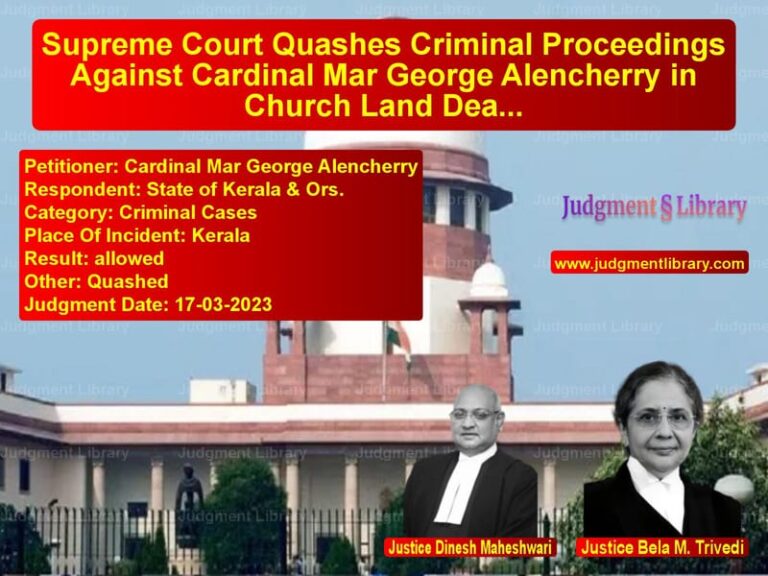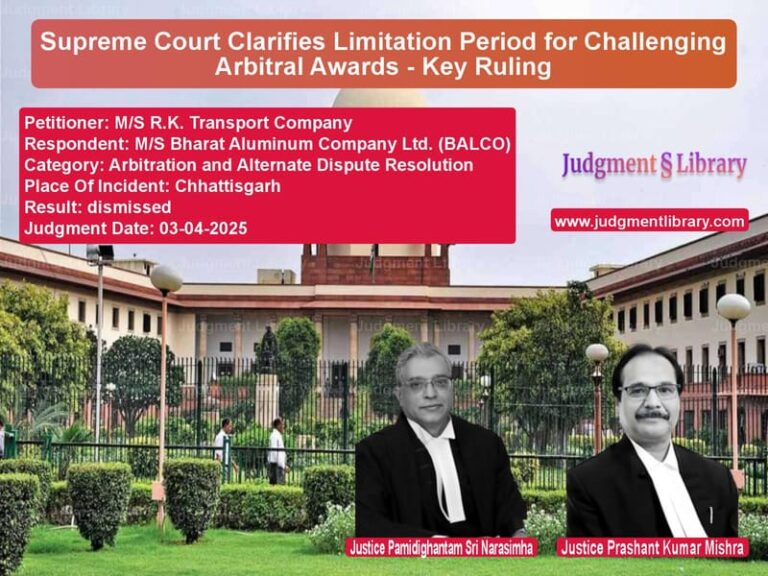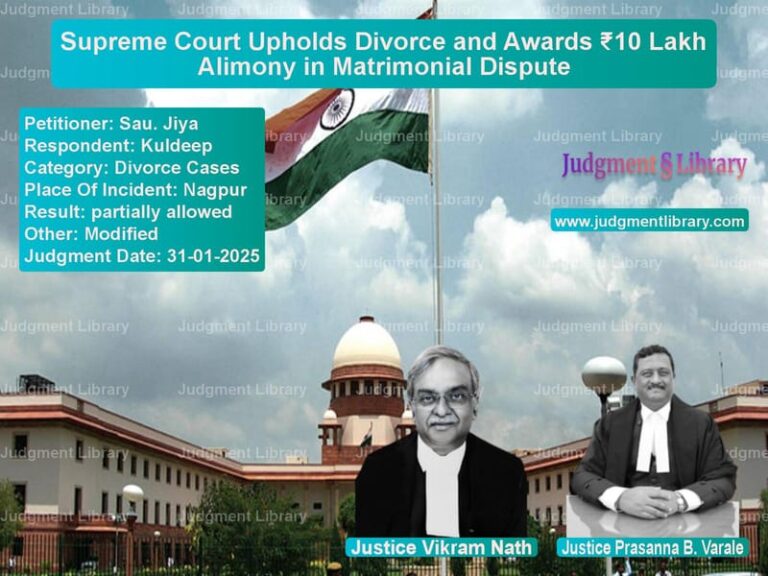Haryana Village Land Dispute: Supreme Court’s Verdict on Shamilat Deh and Panchayat Rights
The Supreme Court of India recently delivered a significant judgment in the case of The State of Haryana Through Secretary to Government of Haryana vs. Jai Singh & Others, addressing the long-standing dispute over the ownership and management of village common lands, known as Shamilat Deh. The case revolved around the amendments made to the Punjab Village Common Lands (Regulation) Act, 1961, as inserted by Haryana Act No. 9 of 1992.
The crux of the case was whether lands reserved for common purposes under the East Punjab Holdings (Consolidation and Prevention of Fragmentation) Act, 1948, vested in the Gram Panchayats or continued to be held collectively by village proprietors. The Supreme Court’s ruling provided clarity on this contentious issue, reinforcing the control of Gram Panchayats over such lands.
Background of the Case
The dispute stemmed from amendments introduced in 1992 to the Punjab Village Common Lands (Regulation) Act, 1961. The amendments defined Shamilat Deh to include lands reserved for common purposes under consolidation schemes, thereby vesting such lands in the Gram Panchayats.
The proprietors of several villages challenged the amendments, arguing that their lands were unfairly taken without compensation and that the state had no authority to transfer their holdings to Panchayats. The Punjab and Haryana High Court, in Jai Singh & Ors. vs. State of Haryana, ruled in favor of the proprietors, declaring the amendments unconstitutional.
Petitioners’ Arguments
The petitioners, primarily village proprietors, raised the following key arguments:
- The amendments violated Article 31-A of the Constitution by acquiring land without compensation.
- The affected lands were not traditionally considered Shamilat Deh and had been wrongfully included under the amended definition.
- The High Court’s ruling should be upheld, as the amendments lacked constitutional validity and infringed upon the property rights of the village proprietors.
- The lands, recorded in revenue records as “Jumla Mushtarka Malkan Wa Digar Haqdaran,” were intended for future use by the proprietors and should not be vested in the Panchayats.
Respondents’ Arguments
The State of Haryana and the Gram Panchayats countered with the following arguments:
- The amendments were necessary to protect common lands from encroachment and ensure their use for the benefit of the village community.
- The vesting of these lands in Panchayats was in line with agrarian reforms and rural governance, thereby making them constitutional.
- The landowners had already received benefits under the consolidation schemes and could not now claim ownership.
- The amendments did not contravene Article 31-A, as they aimed to ensure better land management rather than expropriating land for state use.
Supreme Court’s Judgment
The Supreme Court, in its detailed ruling, upheld the validity of the Haryana amendments, overturning the High Court’s decision. The key observations of the Court included:
- Vesting of Land: The Court ruled that lands reserved for common purposes during consolidation automatically vested in the Gram Panchayats under the 1961 Act.
- Legality of Amendments: The Court found that the amendments were constitutionally valid and did not violate Article 31-A, as they were aimed at ensuring effective land management.
- Common Purpose Land: The Court emphasized that such lands were meant for the collective benefit of villagers and could not be reclaimed by individual proprietors.
- Future Use of Land: The Court clarified that the term “common purposes” included both present and future requirements of the village community, reinforcing that the lands were not to be redistributed among proprietors.
Implications of the Judgment
The ruling has significant implications for village governance and land management in Haryana:
- Strengthening Panchayats: The decision reinforces the authority of Gram Panchayats in managing village common lands, preventing unauthorized encroachments.
- Prevention of Land Misuse: By upholding the amendments, the Court ensured that common lands would be used for their intended purposes rather than being exploited for private gains.
- Precedent for Future Cases: The judgment provides clarity on the interpretation of common lands in the context of consolidation schemes, serving as a reference for similar disputes across the country.
Conclusion
The Supreme Court’s decision in The State of Haryana vs. Jai Singh & Others settles a long-standing dispute over the ownership and control of village common lands. By upholding the validity of the Haryana amendments, the Court has affirmed the role of Gram Panchayats in managing these lands for the collective benefit of village communities. This ruling marks a crucial step in ensuring the protection of public lands and reinforces the principles of rural self-governance.
Petitioner Name: The State of Haryana Through Secretary to Government of Haryana.Respondent Name: Jai Singh & Others.Judgment By: Justice Hemant Gupta, Justice V. Ramasubramanian.Place Of Incident: Haryana.Judgment Date: 07-04-2022.
Don’t miss out on the full details! Download the complete judgment in PDF format below and gain valuable insights instantly!
Download Judgment: the-state-of-haryana-vs-jai-singh-&-others-supreme-court-of-india-judgment-dated-07-04-2022.pdf
Directly Download Judgment: Directly download this Judgment
See all petitions in Property Disputes
See all petitions in Landlord-Tenant Disputes
See all petitions in Specific Performance
See all petitions in Judgment by Hemant Gupta
See all petitions in Judgment by V. Ramasubramanian
See all petitions in allowed
See all petitions in supreme court of India judgments April 2022
See all petitions in 2022 judgments
See all posts in Civil Cases Category
See all allowed petitions in Civil Cases Category
See all Dismissed petitions in Civil Cases Category
See all partially allowed petitions in Civil Cases Category







